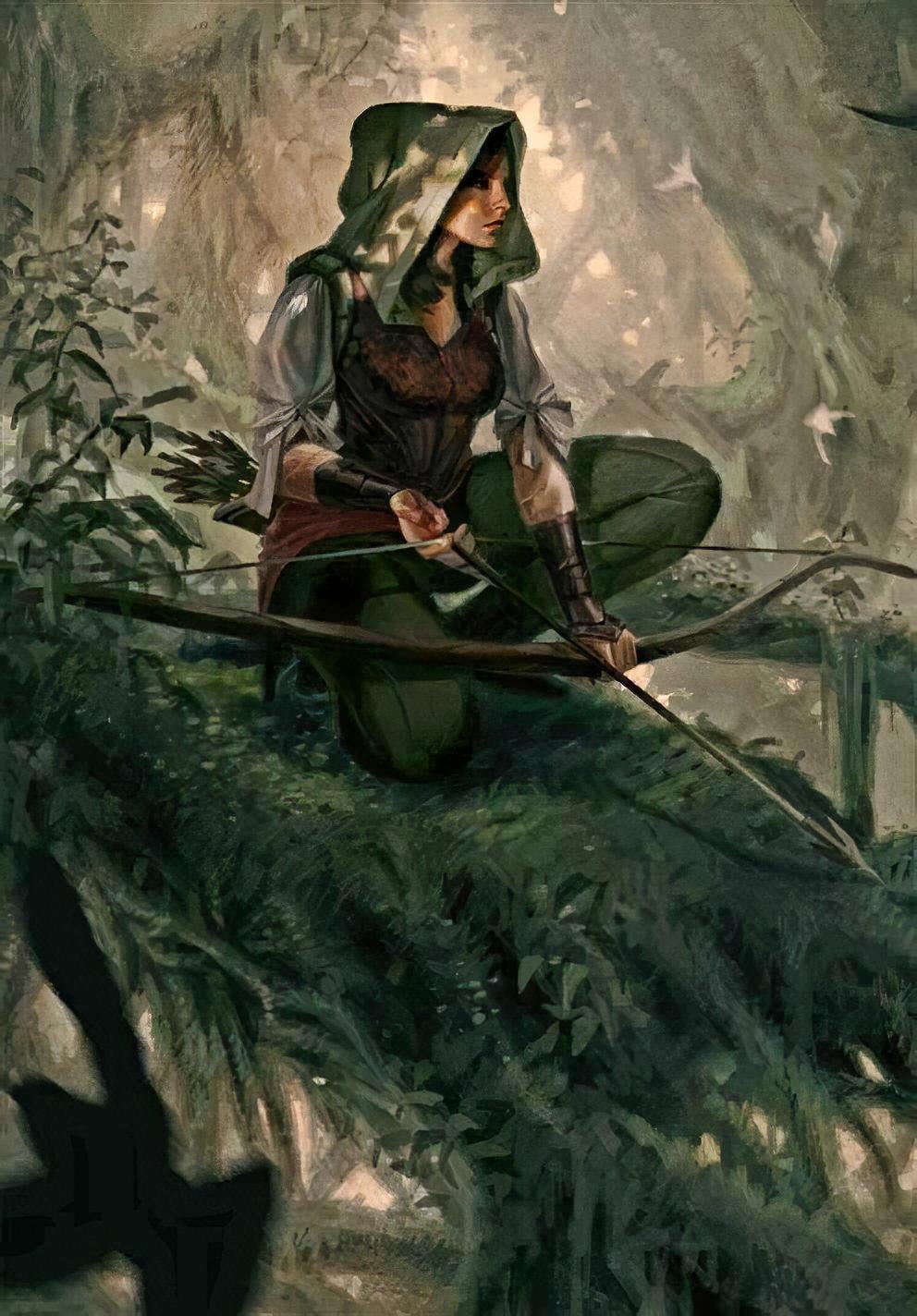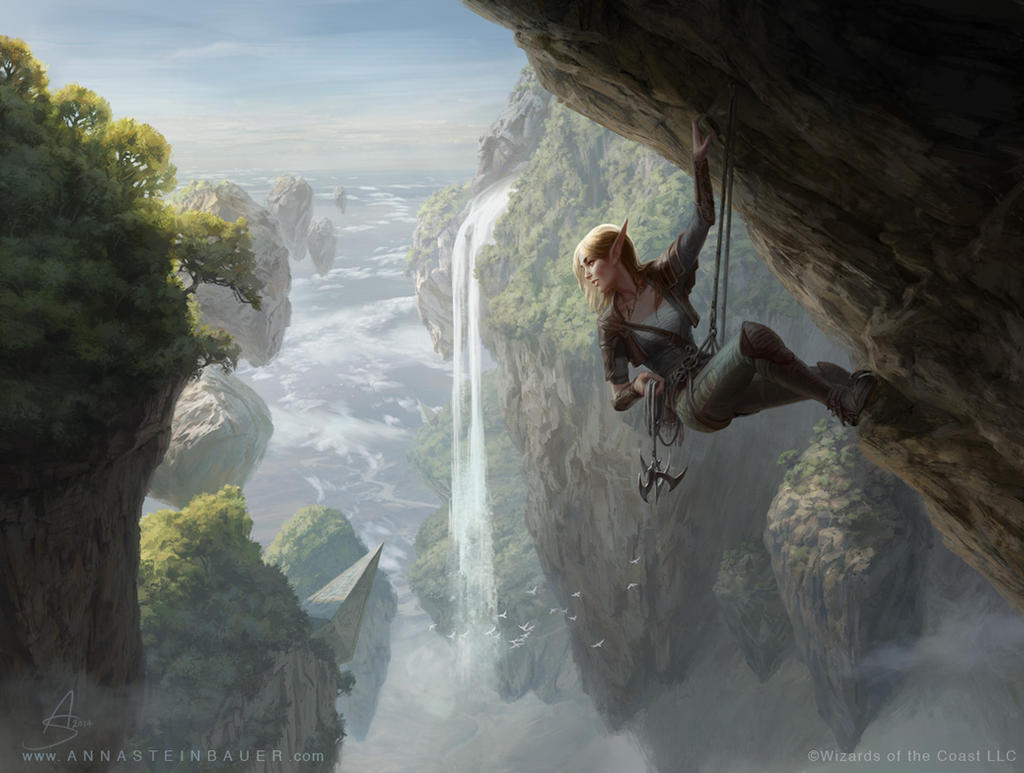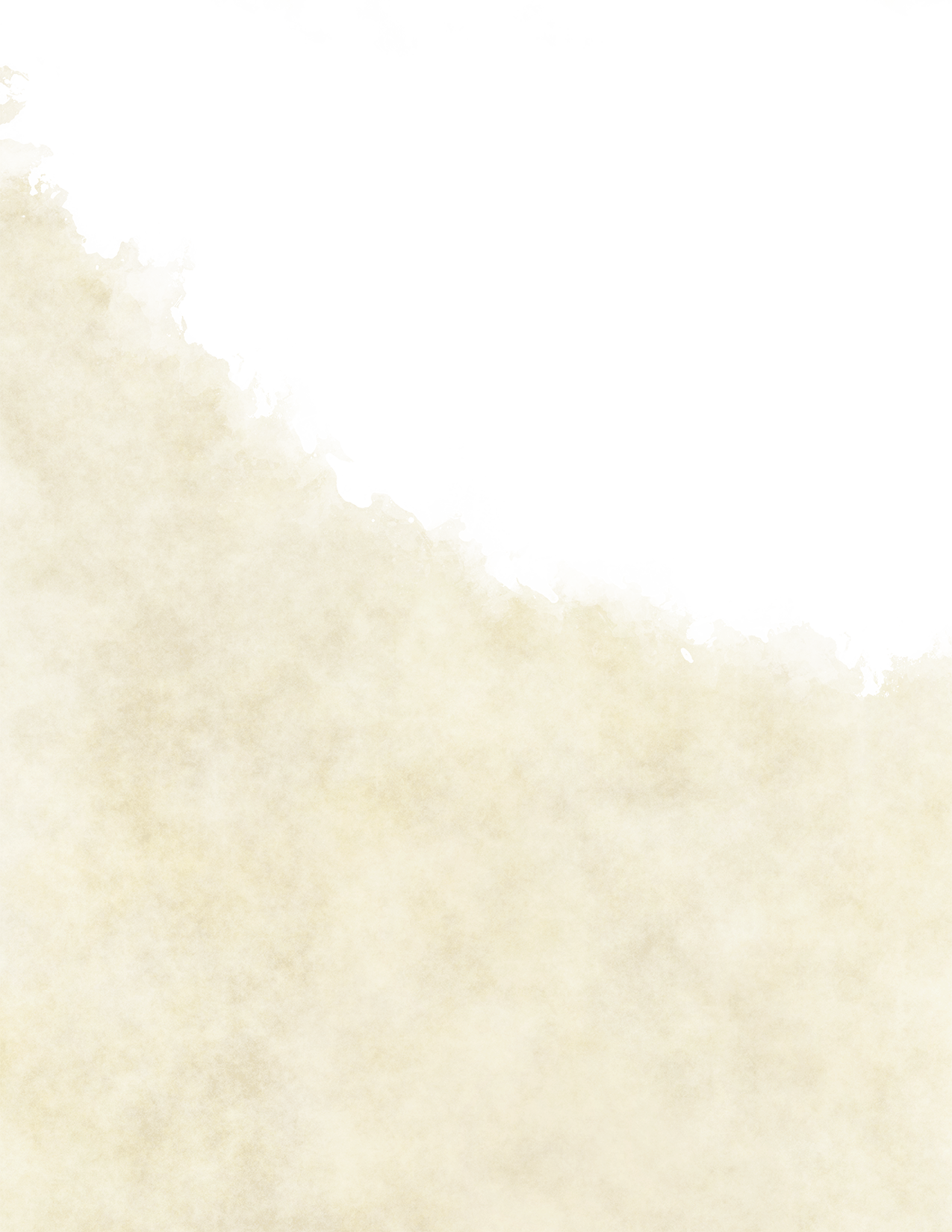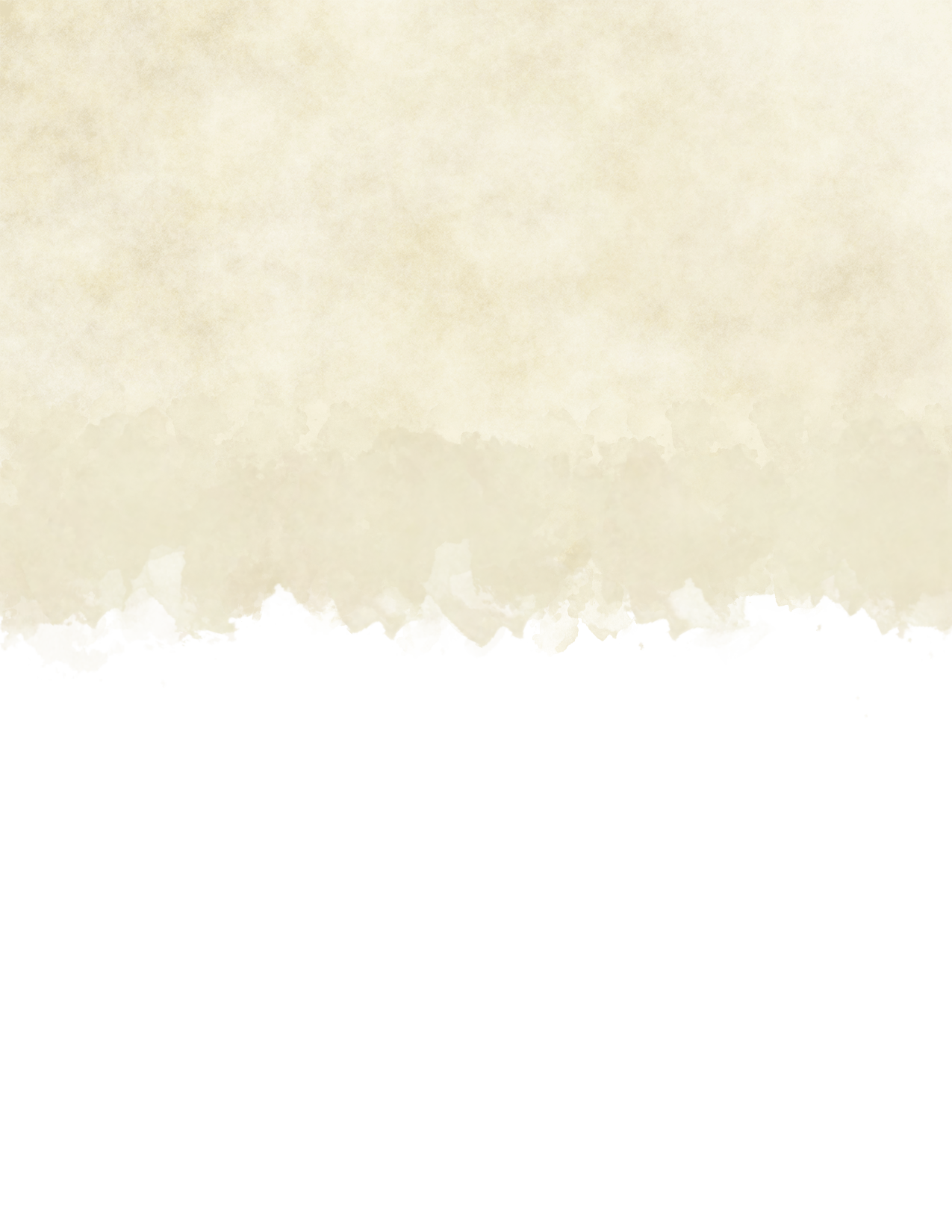


Ranger
Rough and wild looking, a human stalks alone through the shadows of trees, hunting the orcs he knows are planning a raid on a nearby farm. Clutching a shortsword in each hand, he becomes a whirlwind of steel, cutting down one enemy after another.
After tumbling away from a cone of freezing air, an elf finds her feet and draws back her bow to loose an arrow at the white dragon. Shrugging off the wave of fear that emanates from the dragon like the cold of its breath, she sends one arrow after another to find the gaps between the dragon’s thick scales.
Holding his hand high, a half-elf whistles to the hawk that circles high above him, calling the bird back to his side. Whispering instructions in Elvish, he points to the owlbear he’s been tracking and sends the hawk to distract the creature while he readies his bow.
Far from the bustle of cities and towns, past the hedges that shelter the most distant farms from the terrors of the wild, amid the dense-packed trees of trackless forests and across wide and empty plains, rangers keep their unending watch.
Deadly Hunters
Warriors of the wilderness, rangers specialize in hunting the monsters that threaten the edges of civilization—humanoid raiders, rampaging beasts and monstrosities, terrible giants, and deadly dragons. They learn to track their quarry as a predator does, moving stealthily through the wilds and hiding themselves in brush and rubble. Rangers focus their combat training on techniques to track down and eliminate individual foes.
Thanks to their familiarity with the wilds, rangers acquire the ability to cast spells that harness nature’s power, much as a druid does.
Their spells, like their combat abilities, emphasize speed, stealth, and the hunt. A ranger’s talents and abilities are honed with deadly focus on the grim task of protecting the borderlands.
Independent Adventurers
Though a ranger might make a living as a hunter, a guide, or a tracker, a ranger’s true calling is to defend the outskirts of civilization from the ravages of monsters and humanoid hordes that press in from the wild. In some places, rangers gather in secretive orders or join forces with druidic circles. Many rangers, though, are independent almost to a fault, knowing that, when a dragon or a band of orcs attacks, a ranger might be the first -- and possibly the last -- line of defense.
This fierce independence makes rangers well suited to adventuring, since they are accustomed to life far from the comforts of a dry bed and a hot bath. Faced with city-bred adventurers who grouse and whine about the hardships of the wild, rangers respond with some mixture of amusement, frustration, and compassion. But they quickly learn that other adventurers who can carry their own weight in a fight against civilization’s foes are worth any extra burden. Coddled city folk might not know how to feed themselves or find fresh water in the wild, but they make up for it in other ways.
Ranger
| Level | Proficiency Bonus | Features | 1st | 2nd | 3rd | 4th | 5th |
|---|---|---|---|---|---|---|---|
| 1st | +2 | Ambuscade, Natural Explorer | — | — | — | — | — |
| 2nd | +2 | Fighting Style, Spellcasting, Quarry | 2 | — | — | — | — |
| 3rd | +2 | Primeval Awareness, Ranger Conclave | 3 | ─ | ─ | — | — |
| 4th | +2 | Ability Score Improvement | 3 | ─ | ─ | ─ | ─ |
| 5th | +3 | Ranger Conclave feature | 4 | 2 | ─ | ─ | ─ |
| 6th+ | TBD... |
Creating a Ranger
As you create your ranger character, consider the nature of the training that gave you your particular capabilities. Did you train with a single mentor, wandering the wilds together until you mastered the ranger’s ways? Did you leave your apprenticeship, or was your mentor slain—perhaps by the same kind of monster that became your favored enemy? Or perhaps you learned your skills as part of a band of rangers affiliated with a druidic circle, trained in mystic paths as well as wilderness lore. You might be self-taught, a recluse who learned combat skills, tracking, and even a magical connection to nature through the necessity of surviving in the wilds.
What made you join up with a band of adventurers? Do you find it challenging to teach new allies the ways of the wild, or do you welcome the relief from solitude that they offer?
Quick Build
You can make a ranger quickly by following these suggestions. First, make Dexterity your highest ability score, followed by Wisdom. (Some rangers who focus on two-weapon fighting make Strength higher than Dexterity.) Second, choose the outlander background.
Class Features
As a ranger, you gain the following class features
Hit Points
- Hit Dice: 1d10 per ranger level
- Hit Points at 1st Level: 10 + your Constitution modifier
- Hit Points at Higher Levels: 1d10 (or 6) + your Constitution modifier per ranger level after 1st
Proficiencies
- Armor: Light armor, medium armor, shields
- Weapons: Simple weapons, martial weapons
- Tools: None
- Saving Throws: Strength, Dexterity
- Skills: Choose three from Animal Handling, Athletics, Insight, Investigation, Nature, Perception, Stealth, and Survival
Equipment
You start with the following equipment, in addition to the equipment granted by your background:
- (a) scale mail or (b) leather armor
- (a) two shortswords or (b) two simple melee weapons
- (a) a dungeoneer's pack or (b) an explorer's pack
- A longbow and a quiver of 20 arrows
Ambuscade
Beginning at level 1, you can react swiftly and decisively when it is time to attack. You have advantage on initiative rolls.
Natural Explorer
You are particularly skilled at navigating the wilderness and are adept at traveling and surviving outside of towns and cities. While traveling for five minutes or more, you gain the following benefits:
- Difficult terrain does not slow your group's travel.
- Your group can't become lost except by magical means.
- If you are traveling alone, you can move stealthily at a normal pace.
- If you roll an Intelligence or Wisdom check related to your environment (such as tracking an enemy or foraging) and you would add your proficiency bonus to the check, you add twice your proficiency bonus instead.
Fighting Style
At 2nd level, you adopt a particular style of fighting as your specialty. Choose one of the following options. You can’t take a Fighting Style option more than once, even if you later get to choose again.
Archery
You gain a +2 bonus to attack rolls you make with ranged weapons.
Defense
While you are wearing armor, you gain a +1 bonus to AC.
Dueling
When you are wielding a melee weapon in one hand and no other weapons, you gain a +2 bonus to damage rolls with that weapon.
Two-Weapon Fighting
When you engage in two-weapon fighting, you can add your ability modifier to the damage of the second attack.
Spellcasting
By the time you reach 2nd level, you have learned to use the magical essence of nature to cast spells, much as a druid does. See chapter 10 of the Player's Handbook for the general rules of spellcasting. The ranger spell list is detailed at the end of the class description.
Preparing and Casting Spells
The Ranger table shows how many spell slots you have to cast your spells. To cast one of your ranger spells of 1st level or higher, you must expend a slot of the spell's level or higher. You regain all expended spell slots when you finish a long rest.
You prepare the list of ranger spells that are available for you to cast, choosing from the ranger spell list. When you do so, choose a number of ranger spells equal to your Wisdom modifier + half your ranger level, rounded down minimum one spell). The spells must be of a level for which you have spell slots.
For example, if you are a 5th-level ranger, you have four 1st-level and two 2nd-level spell slots. With a Wisdom of 14, your list of prepared spells can include four spells of 1st or 2nd level, in any combination. If you prepare the 1st-level spell animal friendship, you can cast it using a 1st-level or 2nd-level slot. Casting the spell doesn't remove it from your list of prepared spells.
You can change your list of prepared spells when you finish a long rest. Preparing a new list of ranger spells requires time spent in meditation, communing with your natural surroundings.: at least 1 minute per spell level for each spell on your list.
Spellcasting Ability
Wisdom is your spellcasting ability for your ranger spells, since your magic draws on your attunement to nature. You use your Wisdom whenever a spell refers to your spellcasting ability. In addition, you use your Wisdom modifier when setting the saving throw DC for a ranger spell you cast and when making an attack roll with one.
Spell Save DC
Spell attack modifier
Quarry
Starting at 2nd level, after you attack or study a creature, you can spend one ranger spell slot to mystically mark it as your quarry.
You add an extra 1d6 to your damage rolls against that creature, and Wisdom checks you make to find it.
If the creature drops to 0 hit points, you may regain the spell slot you used. When you regain your spell slots, you lose any quarries that you had previously marked.
Study
This class introduces a new action in combat called Study. When you take the Study action, you focus on a single creature. You gain advantage on the next attack you make against that creature, if you attack it before the end of your next turn.
Ranger Conclave
At 3rd level, you choose to emulate the ideals and training of a ranger conclave: your options are detailed at the end of the class description. Your choice grants you features at 3rd level and again at 7th, 11th, and 15th level.


Primeval Awareness
Beginning at 3rd level, you can form a connection with the land to determine if certain creatures are nearby. As an action, choose one kind of creature from the following list:
- one creature type
- one creature subtype
- creatures marked as your quarry
For 1 minute, you know if any creatures of that kind are present within 1 mile of you, and the general direction of the closest one, not including any creatures you can see.
Once you use this ability, you can't use it again until you finish a short or long rest.
Ability Score Improvement
When you reach 4th level, and again at 8th, 12th, 16th, and 19th level, you can increase one ability score of your choice by 2, or you can increase two ability scores of your choice by 1. As normal, you can’t increase an ability score above 20 using this feature.
Using the optional feats rule, you can forgo taking this feature to take a feat of your choice instead.
More Features
TBD...


Ranger Conclaves
The ideal of the ranger has many different expressions. Choose one of the ranger conclaves: Hunter, Beast Master, Gloom Stalker, and Mystic Warden.
Marksman
Becoming a marksman means mastering the art of bow and arrow. Whether raining death on their enemies or ending a combat with a single arrow, marksmen can always answer a fight with their bow in hand. Joining the marksman conclave means honing your skill at ranged combat to absolute perfection.
Volley
Starting at 3rd level, you can fire arrows quickly at adjacent targets. As an action, you can choose two adjacent enemies and make ranged weapon attack against each of them. These are separate attacks, so they are rolled separately.
Precise Shot
At 3rd level, you can focus on a target so precisely that your attack strikes with almost no chance for error. If you take the Study action and then attack your studied target before the end of your next turn, you strike with unparalleled accuracy so long as you do not have disadvantage on the attack.
If you would miss as the result of your attack roll, instead you hit your target. If you would normally hit, instead you score a critical hit as though you had rolled a 20 on your attack.
Improved Volley
At 5th level, the two enemies you choose with Volley no longer need to be adjacent to each other.
Called Shot
At 5th level, when you make an attack that is not at disadvantage, you can declare it a called shot. The attack roll is made with disadvantage, but if the attack hits, you apply an additional effect chosen from the list below. These effects last until the start of your next turn.
Dazing Shot. The target cannot take Reactions and must make a DC 10 Constitution saving throw to cast a spell. If it fails, any action it spent is wasted, but resources (such as spell slots) are not.
Slowing Shot. The target has its movement speed reduced by half.
Harrying Shot. The target has disadvantage on attack rolls.


Hunter
Joining the hunter conclave means accepting your place as a bulwark between civilization and the terrors of the wilderness. As you walk the Hunter’s path, you learn specialized techniques for fighting the threats you face, from rampaging ogres and hordes of orcs to towering giants and terrifying dragons.
Hunter Magic
Starting at 3rd level, you learn additional spells when you reach certain levels, as shown in the table below. The spell counts as a ranger spell for you, but it doesn't count against the number of ranger spells you prepare.
| Ranger Level | Spell |
|---|---|
| 3rd | entangle |
| 5th | zone of truth |
| 9th | magic circle |
| 13th | banishment |
| 17th | hold monster |
Hunter's Prey
As a hunter, you have significant experience studying, tracking, and hunting enemies that you have encountered in the wilds.
At 3rd level, you can spend 5 minutes examining the body of a creature (it need not be dead). After this, you learn its type, subtype, resistances, and immunities.
Once you have examined this kind of creature, you gain a +2 bonus to damage rolls with attacks against creatures of that kind. Additionally, you have advantage on Wisdom (Survival) checks to track your favored enemies, as well as on Intelligence checks to recall information about them.
Extra Attack
Beginning at 5th level, you can attack twice, instead of once, whenever you take the Attack action on your turn.
More Features
TBD...





















Beast Master
The Beast Master conclave embodies a friendship between the civilized races and the beasts of the world. United in focus, beast and ranger work as one to fight the monstrous foes that threaten civilization and the wilderness alike. Joining the Beast Master conclave means committing yourself to this ideal, working in partnership with an animal as its companion and friend.
Beast Master Spells
Starting at 3rd level, you learn additional spells when you reach certain levels, as shown in the table below. The spell counts as a ranger spell for you, but it doesn't count against the number of ranger spells you prepare.
| Ranger Level | Spell |
|---|---|
| 3rd | beast bond |
| 5th | warding bond |
| 9th | catnap |
| 13th | dominate beast |
| 17th | awaken |
Ranger's Companion
At 3rd level, you gain a beast companion that accompanies you on your adventurers and is trained to fight alongside you. The companions you bond with are similar, but not identical to, their wild counterparts. Choose one of the ranger's companions from Appendix: Ranger's Companions.
Add your proficiency bonus to your companion's AC and attack rolls. Your companion's saving throws and skills are identical to your own.
Your companion obeys your commands as best it can. It takes its turn simultaneously with your turn, though it doesn't take an action unless you command it to. On your turn, you can verbally command the beast where to move (no action required by you). You can also use your bonus action to verbally command it to take the Attack, Dash, Disengage, Dodge, or Help action.
You and your companion are bound incredibly tightly. You can speak with your companion almost as though it had a shared language. If you are traveling with only your companion, you can move stealthily at a normal pace.
Your companion shares your alignment, and has a personality trait and a flaw that you can roll for or select from the tables below. Your companion shares your ideal, and its bond is always, “The ranger who travels with me is a beloved companion for whom I would gladly give my life.”
| d6 | Trait |
|---|---|
| 1 | I'm dauntless in the face of adversity. |
| 2 | Threaten my friends, threaten me. |
| 3 | I stay on alert so others can rest. |
| 4 | People see an animal and underestimate me. I use that to my advantage. |
| 5 | I have a knack for showing up in the nick of time. |
| 6 | I put my friends’ needs before my own in all things. |
| d6 | Flaw |
|---|---|
| 1 | If there’s food left unattended, I’ll eat it. |
| 2 | I growl at strangers, and all people except my ranger are strangers to me. |
| 3 | Any time is a good time for a belly rub. |
| 4 | I'm deathly afraid of water. |
| 5 | My idea of hello is a flurry of licks to the face. |
| 6 | I jump on creatures to tell them how much I love them. |
Tandem Attack
Beginning at 5th level, you and your animal companion form a more potent fighting team. When you use the Attack action on your turn, if your companion can see you, it can use its reaction to make a melee attack.
More Features
TBD...













Appendix:
Ranger's Companions
Ranger's Boar
Medium, your alignment
- Armor Class 13
- Hit Points 5 times your ranger level
- Speed 40 ft.
STR DEX CON INT WIS CHA 13 (+1) 11 (+0) 12 (+1) 2 (-4) 9 (-1) 5 (-3)
Keen Hearing and Smell. The ranger's boar has advantage on Wisdom (Perception) checks that rely on hearing or smell.
Charge. If the ranger's boar moves at least 20 ft. straight toward a target and then hits it with a tusk attack on the same turn, the target takes an extra 1d6 slashing damage. If the target is a creature, it must succeed on a DC 11 Strength saving throw or be knocked prone.
Relentless. If the ranger's boar takes 7 damage or less that would reduce it to 0 hit points, it is reduced to 1 hit point instead. After they use this ability, the ranger's boar must finish a short or long rest before they can use it again.
Actions
Tusk. Melee Weapon Attack: +3 to hit, Reach 5 ft., one target. Hit 1d6 + 1 slashing damage.
Ranger's Crocodile
Medium, your alignment
- Armor Class 13
- Hit Points 5 times your ranger level
- Speed 40 ft.
STR DEX CON INT WIS CHA 15 (+2) 10 (+0) 13 (+1) 2 (-5) 10 (+0) 5 (-3)
Hold Breath. The ranger's crocodile can hold its breath for 15 minutes.
Actions
Bite. Melee Weapon Attack: +4 to hit, Reach 5 ft., one target. Hit 1d8 + 2 slashing damage.
Ranger's Hawk (Falcon)
Tiny, your alignment
- Armor Class 15
- Hit Points 3 times your ranger level
- Speed 10 ft., fly 60 ft.
STR DEX CON INT WIS CHA 5 (-3) 16 (+3) 8 (-1) 2 (-4) 14 (+2) 6 (-2)
Keen Sight. The ranger's hawk has advantage on Wisdom (Perception) checks that rely on sight.
Actions
Talons. Melee Weapon Attack: +5 to hit, Reach 5 ft., one target. Hit 1 slashing damage.
Spot. The ranger's hawk can make a Wisdom (Perception) check. Until the start of your turn, the ranger's hawk uses the better of this check or its passive Perception to detect hidden enemies.
Help. The ranger's hawk can aid you in attacking a creature within 5 feet of the ranger's hawk. If you attack the target before your next turn, the first Attack roll is made with advantage. (All creatures can do this, but it is especially useful on a ranger's hawk.)
Ranger's Mastiff
Medium, your alignment
- Armor Class 13
- Hit Points 5 times your ranger level
- Speed 40 ft.
STR DEX CON INT WIS CHA 13 (+1) 14 (+2) 12 (+1) 3 (-4) 12 (+1) 7 (-2)
Keen Hearing and Smell. The ranger's mastiff has advantage on Wisdom (Perception) checks that rely on hearing or smell.
Actions
Bite. Melee Weapon Attack: +2 to hit, Reach 5 ft., one target. Hit 1d6 + 2 piercing damage. If the target is a creature, it must succeed on a DC 11 Strength saving throw or be knocked prone
Ranger's Owl
Tiny, your alignment
- Armor Class 15
- Hit Points 3 times your ranger level
- Speed 5 ft., fly 60 ft.
STR DEX CON INT WIS CHA 3 (-4) 13 (+1) 8 (-1) 2 (-4) 12 (+1) 7 (-2)
Senses darkvision 120 ft.
Flyby. The ranger's owl provokes no opportunity attacks when it flies out of an enemy's reach.
Keen Sight. The ranger's owl has advantage on Wisdom (Perception) checks that rely on sight.
Shared Sight. While the ranger's owl is in the same space as you, you share its senses.
Actions
Talons. Melee Weapon Attack: +5 to hit, Reach 5 ft., one target. Hit 1 slashing damage.
Help. The ranger's owl can aid you in attacking a creature within 5 feet of the ranger's hawk. If you attack the target before your next turn, the first Attack roll is made with advantage. (All creatures can do this, but it is especially useful on a ranger's owl.)
Ranger's Panther
Medium, your alignment
- Armor Class 13
- Hit Points 5 times your ranger level
- Speed 40 ft.
STR DEX CON INT WIS CHA 12 (+1) 15 (+2) 12 (+1) 3 (-4) 12 (+1) 6 (-2)
Keen Smell. The ranger's panther has advantage on Wisdom (Perception) checks that rely or smell.
Pounce. If the ranger's panther moves at least 10 feet straight toward a creature right before hitting it with a claw attack, the target must succeed on a DC 12 Strength saving throw or be knocked prone. If the target is prone, the ranger's panther can take a bonus action to make one bite attack against it.
Actions
Bite. Melee Weapon Attack: +4 to hit, Reach 5 ft., one target. Hit 1d6 + 2 piercing damage.
Claw. Melee Weapon Attack: +4 to hit, Reach 5 ft., one target. Hit 1d4 + 2 slashing damage.
Ranger's Warhorse
Large, your alignment
- Armor Class 13
- Hit Points 5 times your ranger level
- Speed 60 ft.
STR DEX CON INT WIS CHA 18 (+4) 12 (+2) 13 (+1) 2 (-4) 12 (+1) 7 (-2)
Beast of Burden. A ranger's warhorse can handle twice as much weight as would be normal for a creature of its size and Strength. This gives it a carrying capacity of 1,080 pounds.
Trampling Charge. If the ranger's warhorse moves at least 10 feet straight toward a creature right before hitting it with a hooves attack, the target must succeed on a DC 14 Strength saving throw or be knocked prone. If the target is prone, the ranger's warhorse can take a bonus action to make another attack with its hooves against the target.
Actions
Hooves. Melee Weapon Attack: +4 to hit, Reach 5 ft., one target. Hit 1d6 + 4 bludgeoning damage.
Ranger's Wolf
Medium, your alignment
- Armor Class 13
- Hit Points 5 times your ranger level
- Speed 40 ft.
STR DEX CON INT WIS CHA 12 (+1) 15 (+2) 12 (+1) 3 (-4) 12 (+1) 6 (-2)
Keen Hearing and Smell. The ranger's wolf has advantage on Wisdom (Perception) checks that rely on hearing or smell.
Pack Tactics. The ranger's wolf has advantage on an attack roll against a creature if at least one of the wolf's allies is within 5 ft. of the creature and the ally isn't incapacitated.
Actions
Bite. Melee Weapon Attack: +2 to hit, Reach 5 ft., one target. Hit 1d6 + 2 piercing damage.
Artist Credits
Page 1: Milaen, by Lorenzo Mastroianni
Page 2: Seek the Wilds, by Anna Steinbauer
Page 4: Murasa Ranger, by Eric Deschamps
Page 5: Ge Jiaer Scouts, by Jiaojie Feng
Page 6: Red, by Lane Brown
Page 7: Woodland Sleuth, by Tomasz Jedruszek
Page 8: Drizzt Do'Urden, by Tyler Jacobson